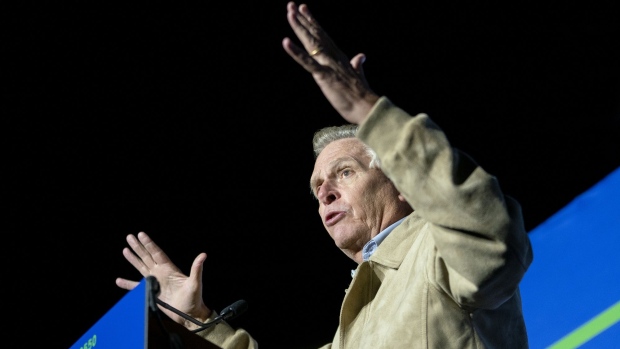Nov 2, 2021
Virginia’s Close Race for Governor Puts Biden’s Agenda to the Test
, Bloomberg News

(Bloomberg) -- Voter turnout in Virginia shot toward a record for a gubernatorial election as the neck-and-neck contest between former Democratic Governor Terry McAuliffe and Republican newcomer Glenn Youngkin came to an end on Tuesday.
The results will provide the most consequential assessment of President Joe Biden’s agenda to date and gauge Republican momentum heading into 2022 midterm elections that will decide which party controls Congress.
The state is on track to break 3 million votes, exceeding the 2017 record, the non-partisan Cook Political Report’s Dave Wasserman, wrote in a tweet Tuesday.
Republicans were seeing heavy participation in their strongholds, though heavily Democratic areas in the Washington suburbs saw turnout around 96% of 2017 totals, based on his analysis of voter turnout reports in late afternoon, Wasserman wrote in another tweet.
Democratic strategist Josh Schwerin said turnout looks like it will be well above the 2.6 million who voted in the last gubernatorial election in 2017, with “very good” African-American turnout, a key voting bloc for McAuliffe.
Virginia polls close at 7 p.m. local time. Surveys have shown Youngkin, the former co-chief executive officer of the Carlyle Group Inc., gaining steadily on McAuliffe who held a commanding lead for much of the summer. They have been tied for the last few weeks.
Biden, at a news conference in Glasgow, Scotland, on Tuesday predicted McAuliffe would win and encouraged Democratic voters to turn out. He also sought to separate the possible electoral setback from the prospects of his infrastructure and $1.75 trillion social spending package that has so far been mired in intra-party bickering in Congress.
And he said it’s no reflection on his presidency if McAuliffe loses.
“I don’t believe, and I’ve not seen any evidence, that whether or not I am doing well or poorly, whether or not I’ve got my agenda passed or not, is going to have any real impact on winning or losing,” Biden said.
The race is closer than expected in a state Biden carried by 10 points in 2020. Anything short of a poll-defying wide victory by McAuliffe is sure to rattle Democrats. Biden’s stalled agenda and sour approval ratings may also scare moderates from aligning themselves too closely with him during next year’s midterm campaigns.
A Youngkin win would be a boost for Republican prospects to take control of both chambers of Congress.
Democrats narrowly control the House, and the Senate only with Vice President Kamala Harris’s tie-breaking vote. History shows that the party that has control of the White House typically loses seats in Congress.
“This being the first mid-term of the election cycle, or a kind of mid-term, the elections favor the party out of power,” said Neil Newhouse, a Republican strategist. “It’s kind of a perfect storm. The political environment is such that Youngkin has some wind at his back.”
Virginia also tends to punish the president’s party. In the last 12 Virginia gubernatorial elections, the president’s party has won only once: when McAuliffe was first elected in 2013. Virginia governors cannot serve back-to-back terms but can run again.
Youngkin’s strategy was to keep former President Donald Trump’s voters by appealing to them in the primary while peeling off some independents who backed Biden in the general election.
McAuliffe took advantage of the state’s new, 45-day early voting period, among the longest in the country, to bring in party heavyweights including Biden, Harris, former President Barack Obama and other big names to stoke turnout.
Youngkin also targeted early voters with a series of small events outside polling places, even though Republicans are more skeptical of early voting in part because of Trump’s repeated attacks on the practice.
McAuliffe repeatedly sought to tie Youngkin to Trump, but also ran on a slate of positions that largely reflect Biden’s, including paid family leave, clean energy and an increase in the state’s minimum wage.
“I don’t think McAuliffe was successful at painting him as a Trump acolyte,” Newhouse said.
Expensive Race
Youngkin embraced Trump in more rural parts of the state, while keeping the former president at arm’s length and refusing to campaign with him. The Republican highlighted both hot-button issues like mask mandates and critical race theory as a K-12 curriculum with moderate ideas like cutting a grocery tax.
The high stakes sparked fundraising for both candidates and made this year’s contest the state’s most expensive yet, according to the nonpartisan, nonprofit Virginia Public Access Project.
A former chairman of the Democratic National Committee and Democratic Governor’s Association, McAuliffe raised $57.1 million for the race. But Youngkin had $57.7 million to spend, thanks in part to a $20 million personal loan to his campaign.
©2021 Bloomberg L.P.


